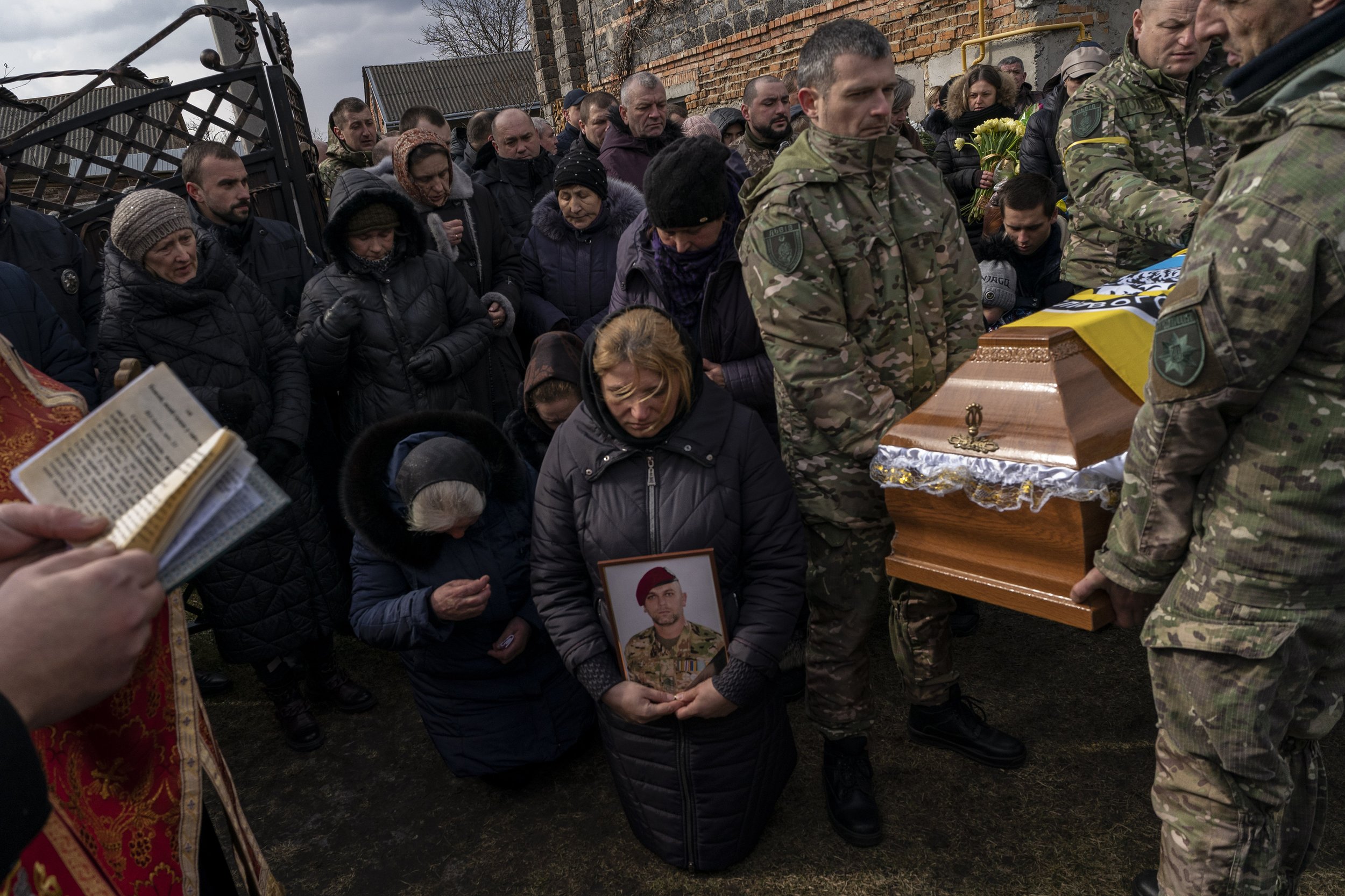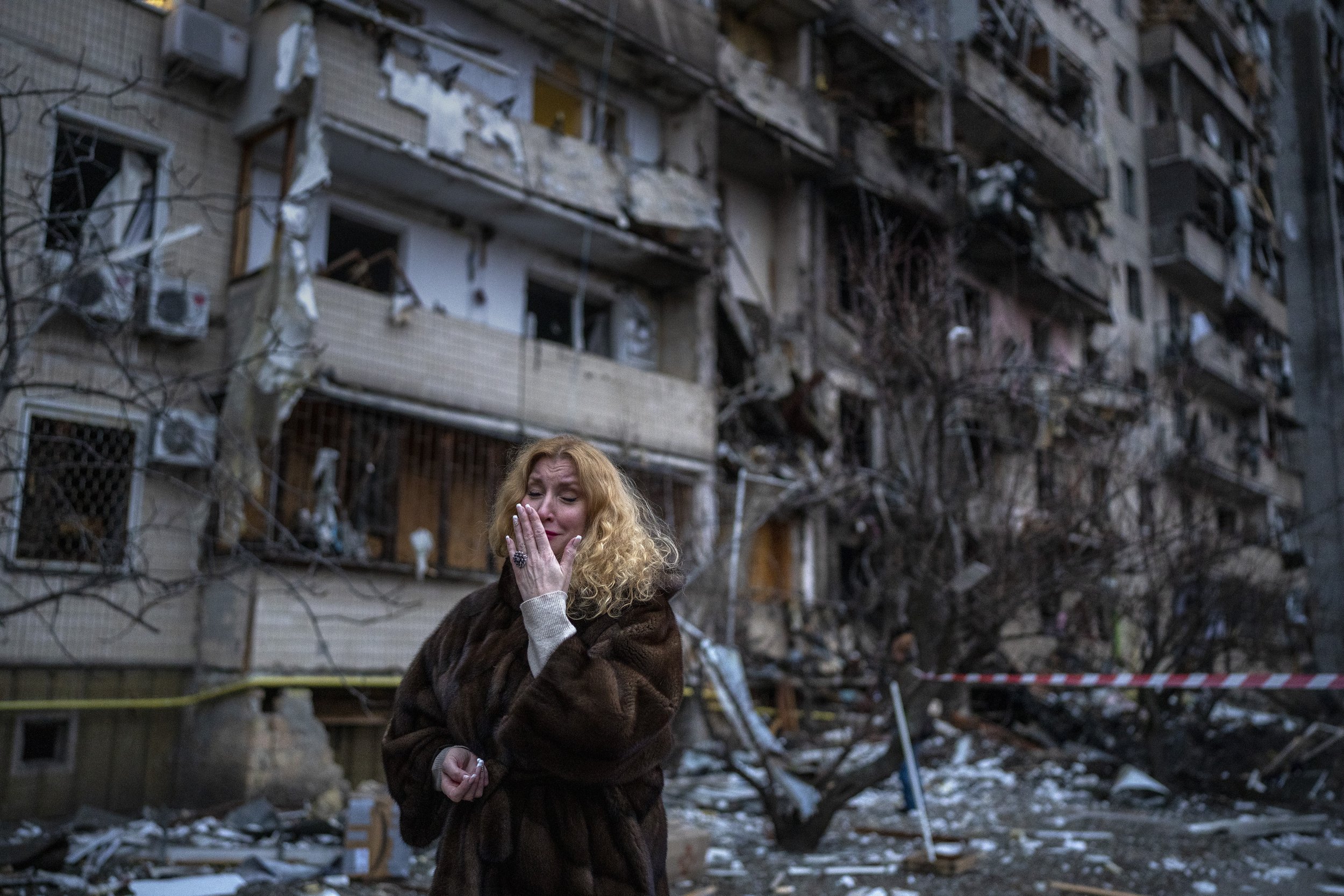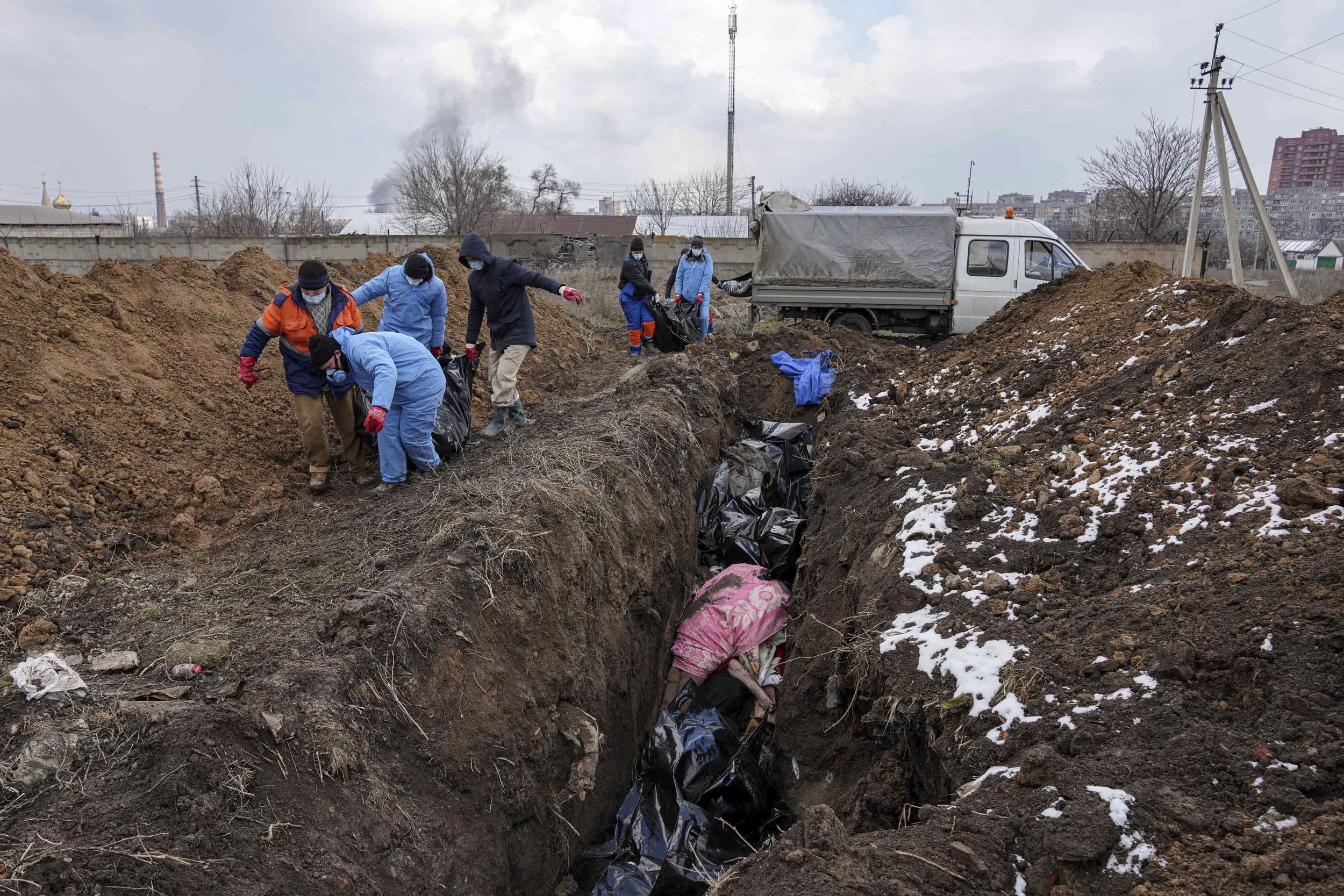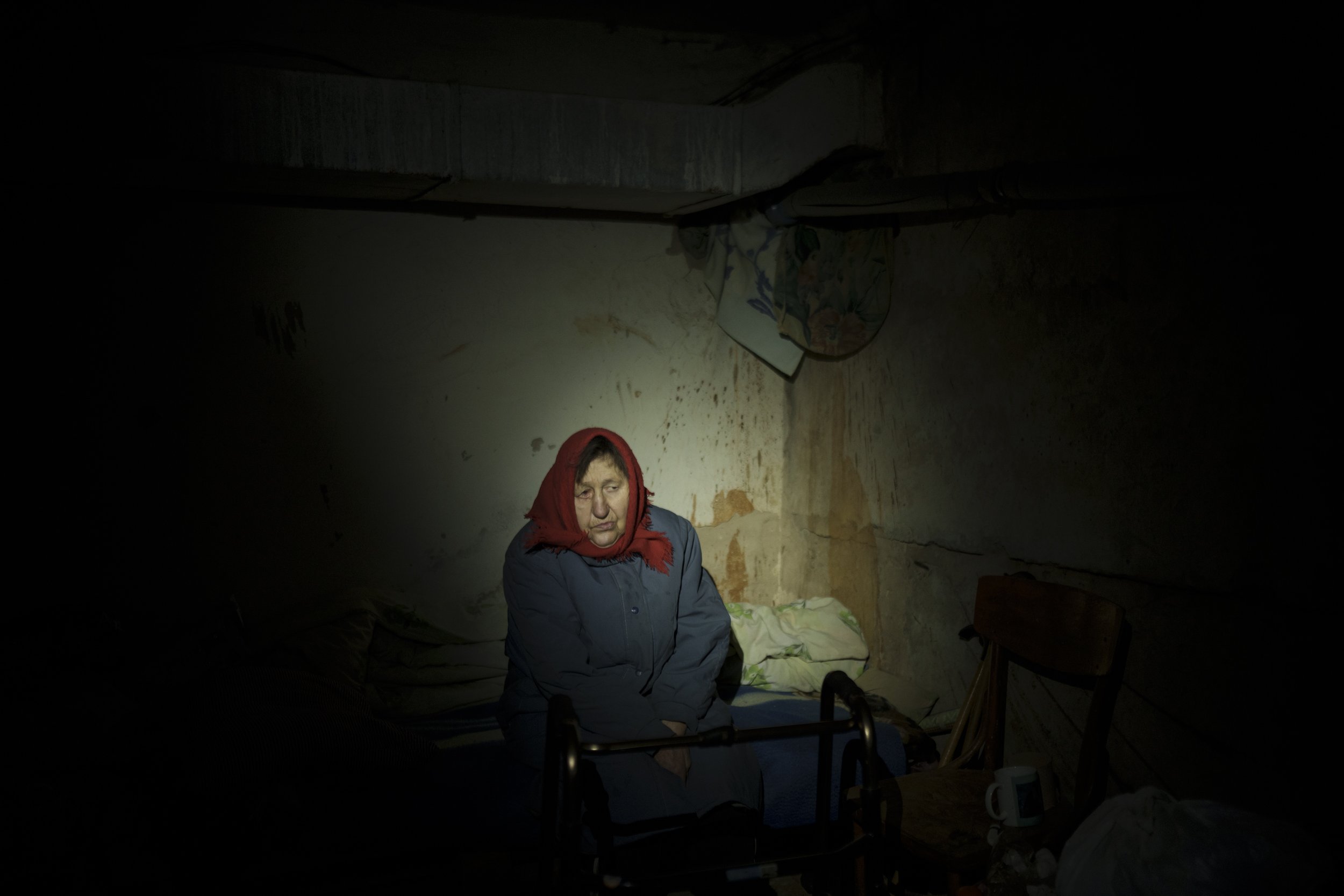1 MONTH: War in Ukraine rages on; 3M have fled

For weeks there had been warnings: Russian troops are massing near the border. President Vladimir Putin intends to seize control of Ukraine. The invasion is coming. Be ready.
But how could that be possible? It had been generations since most anyone in this part of the world had heard the thunder of invading tanks. This was the age of McDonald’s, of Netflix. For many Ukrainians, it simply seemed impossible. Even President Volodymyr Zelenskyy, now the unshaven, T-shirt-wearing leader who rallies his people from fortified bunkers, said in late January that the threat seemed no worse than a year earlier.
And then, on Feb. 24, it happened.
Missiles struck targets across Ukraine. Tanks and soldiers streamed across the border. Russian forces, it seemed, would soon reach the capital, Kyiv.
Instead, nimble, heavily armed Ukrainian soldiers and volunteers protected their country ferociously, slowing the advance of Russia’s mechanized army. Putin’s frustration grew, and with it the brutality of Russian forces, who began to bombard cities, killing the same people the Russian president claimed he was protecting.
Every day, more and more people fled the country. Every day, the death toll climbed.
Thursday marks one month since the invasion was launched. Associated Press photographers have been there every day.
In the hours after the attack, the slow drip of Ukrainians fleeing their homeland turned into a torrent. They filled trains and buses. Their cars clogged the roads. The violence shocked Ukraine, as the first civilian buildings were destroyed by Russian attacks.
A woman and child peer out of the window of a bus as they leave Sievierodonetsk on Feb. 24. (AP Photo/Vadim Ghirda)
Natali Sevriukova weeps next to her house following a rocket attack in Kyiv on Feb. 25. (AP Photo/Emilio Morenatti)
Fear spread as the ferocity of the invasion became increasingly clear. A child was killed in the soon-to-be besieged city of Mariupol. Ukrainian forces began hammering the invaders. Tens of thousands of people fled the country, both Ukrainians and the many foreigners who had come to the country to work, study, go on vacation. Hospitals moved underground to escape attacks, trying to protect the most vulnerable.
The body of a girl killed during the shelling of a residential area lies on a medical cart at the city hospital of Mariupol, Feb. 27. (AP Photo/Evgeniy Maloletka)
A Russian armored personnel carrier burns amid damaged and abandoned vehicles after fighting in Kharkiv on Feb. 27. (AP Photo/Marienko Andrew)
African residents wait at the platform inside Lviv railway station, Feb. 27, in Lviv. (AP Photo/Bernat Armangue)
An oncology patient rests next to his mother, in a basement used as a bomb shelter, in Kyiv on Feb. 28. (AP Photo/Emilio Morenatti)
Ukraine’s civilian volunteer forces grew as thousands of weapons were distributed to people who just days before had been teachers or engineers or janitors. Some volunteers died just days into the fighting. Volunteers began distributing food, diapers, medical supplies and more.
Morgue workers look at the body of a killed volunteer of Ukraine's territorial defense forces at a hospital in Brovary on March 1. (AP Photo/Efrem Lukatsky)
Ukrainian volunteers sort donated foods while Ukrainian President Volodymyr Zelenskyy appears on television in Lviv, on March 2. (AP Photo/Bernat Armangue)
Members of the Ukrainian territorial defense guard a checkpoint in Gorenka, on March 2. (AP Photo/Vadim Ghirda)
By the beginning of March, the United Nations estimated that at least 1 million people had fled Ukraine. In less than one week, more than 2% of the country had left. Most headed first to Lviv, in western Ukraine, which had seen few Russian attacks. Families were increasingly divided.
Stanislav, 40, says goodbye to his son David, 2, and his wife Anna, 35, on a train to Lviv at the Kyiv station, on March 3. (AP Photo/Emilio Morenatti)
A girl and her brother sit on a train bound for Lviv at the Kyiv station on March 3. (AP Photo/Emilio Morenatti)
Natalia, 57, cries as she says goodbye to her daughter and grandson on a train to Lviv at the Kyiv station on March 3. (AP Photo/Emilio Morenatti)
Mariupol, a key port city on the Azov Sea, was quickly besieged by Russian forces. People struggled with no electricity or running water. Russian bombardments grew ever more fierce. Hospitals became scenes of anguish as doctors worked feverishly to save a steady tide of men, women and children wounded in the incessant shelling. Many times, their injuries were just too grievous.
Medical workers unsuccessfully try to save the life of Marina Yatsko's 18-month-old son Kirill, who was fatally wounded by shelling, at a hospital in Mariupol, March 4. (AP Photo/Evgeniy Maloletka)
The children of medical workers warm themselves in a blanket in Mariupol on March 4. (AP Photo/Evgeniy Maloletka)
People lie on the floor of a hospital during shelling by Russian forces in Mariupol on March 4. (AP Photo/Evgeniy Maloletka)
From Lviv, most refugees have gone to nearby Poland, but others have taken refuge in Romania, Moldova, Hungary, Slovakia and elsewhere. Unlike the cities that have been under continual attack, Lviv has largely been able to carry on as usual, even offering its internally displaced visitors a break from the violence with free tours to introduce them to the city's rich culture.
The city hasn't buried its head in the sand, however. In preparation for possible attacks, officials have closed the important national museum, wrapped historically important statues in protective coverings and shielded some of their beautiful churches' stain-glassed windows. And they've converted a theater into an aid center where the displaced can find clothing and other necessities donated by residents.
People trying to flee Ukraine wait for trains inside Lviv railway station on March 4. (AP Photo/Felipe Dana)
Ukrainian civilians receive weapons training on the outskirts of Lviv, on March 7. (AP Photo/Bernat Armangue)
Lenin sculptures are placed on the patio of the Andrey Sheptytsky National Museum in Lviv on March 4. (AP Photo/Bernat Armangue)
Ukrainians pick out clothes inside a cinema-turned aid center in Lviv on March 12, 2022. (AP Photo/Bernat Armangue)
Across the country, the war has taken a terrible toll on civilians. Many Ukrainians now live underground, in bomb shelters and subway stations; others receive military training to help defend their country. Thousands of people have fled across the Irpin River, on the outskirts of Kyiv. The United Nations now estimates more than 3.5 million people have left the country.
A man plays with a baby in a bomb shelter in Mariupol on March 6. (AP Photo/Evgeniy Maloletka)
The body of a person killed by Russian shelling lies in the street in the town of Irpin on March 6. (AP Photo/Diego Herrera Carcedo)
Ukrainians crowd under a destroyed bridge as they try to flee across the Irpin River on March 8. (AP Photo/Felipe Dana)
A child is carried on a stroller across an improvised path while fleeing Irpin on March 9. (AP Photo/Felipe Dana)
Relatives and friends mourn at the funeral of senior police sergeant Roman Rushchyshyn in the village of Soposhyn on March 10. (AP Photo/Bernat Armangue)
With residents unable to bury their dead because of the nonstop shelling in the besieged city of Mariupol, authorities eventually began burying them in mass graves. A maternity hospital also came under attack. At least one pregnant woman died shortly after her baby was born dead. Another survived and gave birth days later.
Ukrainian emergency employees and volunteers carry an injured pregnant woman from a maternity hospital damaged by shelling in Mariupol on March 9. The baby was born dead. Half an hour later, the mother died too. (AP Photo/Evgeniy Maloletka)
Dead bodies are put into a mass grave on the outskirts of Mariupol, March 9, 2022. (AP Photo/Evgeniy Maloletka)
Seen through a broken window, a fire burns at an apartment building after the shelling of a residential district in Mariupol, March 11. (AP Photo/Evgeniy Maloletka)
Serhiy Kralya, 41, looks at the camera after surgery at a hospital in Mariupol on March 11, 2022. (AP Photo/Evgeniy Maloletka)
Russian army tanks move down a street on the outskirts of Mariupol, March 11, 2022. (AP Photo/Evgeniy Maloletka)
Now, one month after the invasion began and amid tenuous cease-fire talks, the Russians are upping their attacks and Ukrainian defense forces are fighting back more fiercely than ever. With their lives at stake in the unabating violence, thousands more residents flee, and the death toll keeps on rising.
Soldiers walk on a path as smoke billows from the town of Irpin on March 12. (AP Photo/Felipe Dana)
An elderly woman hides in a basement for shelter, with no electricity, in Irpin, on March 13. (AP Photo/Felipe Dana)
Ukrainian soldiers take cover from incoming artillery fire in Irpin on March 13. (AP Photo/Felipe Dana)
Now, one month, later, amid tenuous negotiations for a cease-fire, the Russians are upping their attacks and Ukrainian defense forces are fighting back more fiercely than ever. With their lives at stake in the unabating violence, thousands more residents flee, and the death toll keeps on rising.
A man injured in a bombing lies on a stretcher in a hospital hallway in Brovary on March 17, 2022. (AP Photo/Felipe Dana)
Displaced Ukrainians wait to board a Poland-bound train in Lviv on March 13. (AP Photo/Bernat Armangue)
A police officer shows the covered bodies of children killed by shelling in Mariupol on March 15. (AP Photo/Evgeniy Maloletka)
Text from AP News story, 1 MONTH: War in Ukraine rages on; 3M have fled

































